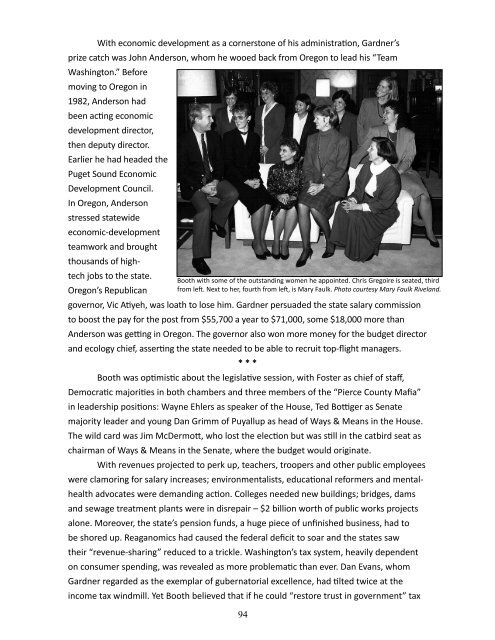booth gardner - Washington Secretary of State
booth gardner - Washington Secretary of State
booth gardner - Washington Secretary of State
You also want an ePaper? Increase the reach of your titles
YUMPU automatically turns print PDFs into web optimized ePapers that Google loves.
With economic development as a cornerstone <strong>of</strong> his administration, Gardner’s<br />
prize catch was John Anderson, whom he wooed back from Oregon to lead his “Team<br />
<strong>Washington</strong>.” Before<br />
moving to Oregon in<br />
1982, Anderson had<br />
been acting economic<br />
development director,<br />
then deputy director.<br />
Earlier he had headed the<br />
Puget Sound Economic<br />
Development Council.<br />
In Oregon, Anderson<br />
stressed statewide<br />
economic-development<br />
teamwork and brought<br />
thousands <strong>of</strong> hightech<br />
jobs to the state.<br />
Oregon’s Republican<br />
governor, Vic Atiyeh, was loath to lose him. Gardner persuaded the state salary commission<br />
to boost the pay for the post from $55,700 a year to $71,000, some $18,000 more than<br />
Anderson was getting in Oregon. The governor also won more money for the budget director<br />
and ecology chief, asserting the state needed to be able to recruit top-flight managers.<br />
* * *<br />
Booth was optimistic about the legislative session, with Foster as chief <strong>of</strong> staff,<br />
Democratic majorities in both chambers and three members <strong>of</strong> the “Pierce County Mafia”<br />
in leadership positions: Wayne Ehlers as speaker <strong>of</strong> the House, Ted Bottiger as Senate<br />
majority leader and young Dan Grimm <strong>of</strong> Puyallup as head <strong>of</strong> Ways & Means in the House.<br />
The wild card was Jim McDermott, who lost the election but was still in the catbird seat as<br />
chairman <strong>of</strong> Ways & Means in the Senate, where the budget would originate.<br />
With revenues projected to perk up, teachers, troopers and other public employees<br />
were clamoring for salary increases; environmentalists, educational reformers and mentalhealth<br />
advocates were demanding action. Colleges needed new buildings; bridges, dams<br />
and sewage treatment plants were in disrepair – $2 billion worth <strong>of</strong> public works projects<br />
alone. Moreover, the state’s pension funds, a huge piece <strong>of</strong> unfinished business, had to<br />
be shored up. Reaganomics had caused the federal deficit to soar and the states saw<br />
their “revenue-sharing” reduced to a trickle. <strong>Washington</strong>’s tax system, heavily dependent<br />
on consumer spending, was revealed as more problematic than ever. Dan Evans, whom<br />
Gardner regarded as the exemplar <strong>of</strong> gubernatorial excellence, had tilted twice at the<br />
income tax windmill. Yet Booth believed that if he could “restore trust in government” tax<br />
Booth with some <strong>of</strong> the outstanding women he appointed. Chris Gregoire is seated, third<br />
from left. Next to her, fourth from left, is Mary Faulk. Photo courtesy Mary Faulk Riveland.<br />
94

















